Families of Parishes will be communities of charity and justice, serving those most in need and working to change systems that oppress and marginalize.
Human Dignity: The Families of Parishes seek ways to recognize the human dignity of each person, who is created in the “image of God.” (Second Vatican Council, Gaudium et Spes, 12-32) This demands special attention to the poor and vulnerable, including the unborn and their parents; the stranger; persons who are elderly, sick, poor, imprisoned, and marginalized; persons with disabilities; and persons of all ethnicities and cultures. This also entails urgently protecting the integrity of Creation, which has its own intrinsic value and is humanity’s common home. (Pope Francis, Ladauto Si’, 139)
Formation: Families of Parishes educate and form parishioners, staff, and clergy – utilizing the rich history of Catholic Social Teaching and Scripture – on what it means to be a community of “salt and light” in today’s world. (Mt 5:13-16) The Families are nurtured through liturgy and formation to grow as a people who model mercy, grace, and forgiveness and who accompany the marginalized on their journeys toward empowerment.
Belonging: The Family of Parishes actively facilitates the inclusion, affirmation, and meaningful participation of all Catholics in the community of faith.
Charity & Justice: Families of Parishes exercise the ministries of charity and justice, which flow necessarily from our sacramental life and radiate as an indispensable expression of the Church’s very being. (Pope Benedict XVI, Deus Caritas Est, 25) Significant numbers of parishioners engage in activities of both direct service to the vulnerable and public advocacy to protect all human life and dignity from conception to natural death.
Presence and Solidarity: Families of Parishes inspire all community members to go beyond regular Mass-goers and their buildings to be the light of Christ and to encounter Christ in all, both locally and across the globe. Parishioners practice a firm and preserving determination to commit themselves to the common good, recognizing that “we are all really responsible for all.” (Pope St. John Paul II, Sollicitudo Rei Socialis, 38)
Every Family of Parishes must offer support to their communities through the spiritual and corporal works of mercy and promote a culture of life, charity and justice.
What This Means: Families of Parishes empower the faithful to accomplish this through organized ministries of service and justice. The U.S. Catholic bishops provide their vision for such organization through their statements Communities of Salt and Light: Pastoral Reflections on the Social Mission of the Parish and Pastoral Plan for Pro-Life Activities. The goal is to engage as many of the baptized as possible in this work and to nurture the structures that ensure that social mission holds a prominent place in the life of the Family of Parishes.
Why This Matters: The Church has a three-fold responsibility: to administer the sacraments, proclaim the Word and exercise the ministries of charity and justice (Deus Caritas Est, 25a and Caritas in Veritate). As Catholics, we are to build a civilization of love that cares for God’s creation and that advances the lives and dignity of all from conception until natural death.
Every Family of Parishes will incorporate principles of Catholic Social Teaching into faith formation efforts for youth and adults.
What This Means: Catholic Social Teaching and the Church’s prophetic witness on related, current issues are to be integrated into faith formation plans of the Family of Parishes and incorporated, as appropriate, into liturgies and homilies.
Why This Matters: From its roots in Scripture to its formal articulation in modern times (1891 to present), “Catholic social teaching is a central and essential element of our faith” (U.S. Bishops, Sharing Catholic Social Teaching: Challenges and Directions). It empowers the faithful to read the “signs of the times” (Compendium of the Social Doctrine of the Church and Gaudium et Spes, no. 4). Parishes have a responsibility to catechize the faithful, of all ages, with this guide map for witnessing to the love of Christ in our social realities. Through this social evangelization, the faithful become missionary disciples in healing a broken world, witnessing to the “inseparable bond between our acceptance of the message of salvation and genuine fraternal love” (Evangelii Gaudium, no.179).
Every Family of Parishes will promote intercultural competence and facilitate the participation of all people in the life of the Church.
What This Means: In order to build a true culture of life, our Families of Parishes must continue to meet the challenge to overcome prejudice, include the marginalized in parish life and advance skills among its staff and faithful to competently and lovingly relate to those of different backgrounds. This can be achieved through proactive efforts to identify and involve in parish activities parishioners from non-majority backgrounds, as well as training leadership in intercultural competence.
Why This Matters: Our archdiocese is a greater witness to the love of God for the whole human family, thanks to the diversity of race, culture, ability and other backgrounds among its faithful. Our communities continue to struggle to overcome the sin of racism, and many persons with disabilities yearn for the Church to “welcome gratefully those who seek to participate in the ecclesial community” (U.S. Bishops, Open Wide Our Hearts: The Enduring Call to Love and Pastoral Letter on Persons with Disabilities).
I am convinced that Beacons of Light, born of great hope, will enable us to form stronger parishes, centered on the Eucharist, that radiate the love of Christ and joy of the Gospel… God has abundantly blessed our first two centuries and will certainly bless the next.
— ARCHBISHOP DENNIS M. SCHNURR
